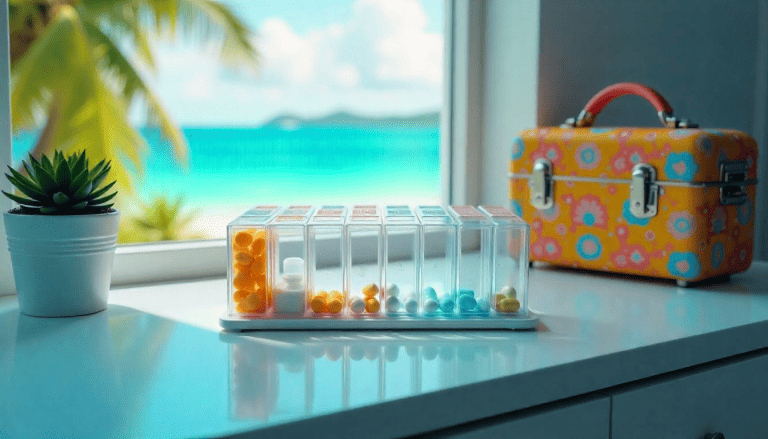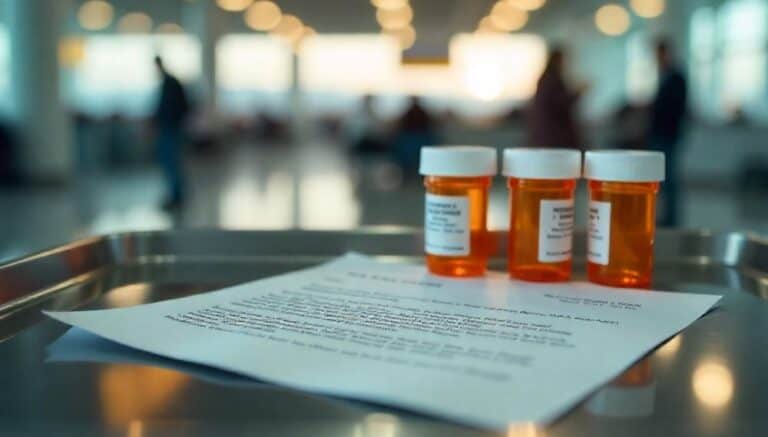Adapter vs Converter: Best Picks for Medical Travel

Packing for an international trip is stressful enough—especially when you’re flying with medication and flying with medical devices that must work the moment you arrive. Choosing the right travel adapter or converter isn’t just about charging your phone—it can mean the difference between keeping your insulin cold, your CPAP running, or your hearing aid charged…or losing them entirely.
In this guide, I’ll help you:
- Understand the difference between an adapter and a converter
- Pick the best travel adapter or converter for your specific needs
- Avoid common mistakes that ruin sensitive medical equipment
- See my top recommended products that are TSA-friendly and trusted by real travelers
1. Why Adapter vs Converter Matters When Flying With Medication or Medical Devices
If you’ve read my guides on Flying With Medication and Flying With Medical Devices, you already know that power and temperature control are critical when traveling. When you’re flying with medication—especially temperature-sensitive types like insulin—or traveling with medical devices such as portable nebulizers, CPAP machines, or hearing aids, using the wrong power setup can ruin your trip.
This is especially critical for diabetic travelers, where a malfunctioning cooler could mean spoiled insulin within hours. The right power gear ensures your equipment stays functional from the airport to your hotel room.
2. The Quick Answer – Adapter vs Converter
📌 Keen Quick Box
⚡ Adapter = Changes the plug shape (so it fits the wall outlet)
⚡ Converter = Changes the voltage (so your device gets the right amount of power)
💡 How to remember:
- If your device says 100–240V, you only need an adapter 🌍
- If it says 110V only, you’ll need a converter 🔌
Keen Tip: An adapter won’t protect a single-voltage device from high-voltage power. Plugging a 110V-only cooler, CPAP, or pump directly into 220V without a converter can destroy it instantly—especially critical when flying with medication or flying with medical devices that you can’t replace mid-trip.
3. How to Tell Which You Need
Step-by-Step Voltage Check
1️⃣ Find the power label or brick on your device.
2️⃣ Look for “INPUT” followed by numbers like 100–240V or 110V.
3️⃣ Decide what you need:
- 100–240V → Works worldwide with an adapter only
- 110V only → Needs a converter abroad
4️⃣ Check plug shape for your destination to choose the right adapter type.
📌 Example: Diabetes Travel Scenario
- USB-powered insulin cooler →
5V(needs only an adapter for the USB plug) - Older insulin pump charger →
110V(needs a converter + adapter)
4. Voltage by Country – Quick Reference
| Country / Region | Voltage | Plug Types | Converter Needed for 110V Devices? |
|---|---|---|---|
| United States | 120V | A, B | No |
| United Kingdom | 230V | G | ✅ Yes |
| France / Germany / Italy | 230V | C, E, F | ✅ Yes |
| Australia / New Zealand | 230V | I | ✅ Yes |
| Japan | 100V | A, B | No (check frequency) |
| UAE / Saudi Arabia | 230V | G | ✅ Yes |
| Mexico | 127V | A, B | No |
| China | 220V | A, C, I | ✅ Yes |
KEEN TIP: Always check voltage before you leave. Replacing a cooler or charger mid-trip can be difficult and expensive. For the most accurate, official details, see the Electric Current Worldwide (ECW) database from the U.S. International Trade Administration. It lists voltage, frequency, and plug type information for almost every country. You can also view the IEC World Plugs Map from the International Electrotechnical Commission for a visual reference of plug shapes and compatibility worldwide.
5. Best Adapter, Converter & Cooling Picks for Travelers With Medical Needs
When you’re flying with medication or flying with medical devices, not just any gear will do. These are my vetted, budget-friendly picks for safety, reliability, and TSA-friendliness.
5.1 Best for All-in-One Convenience – EPICKA Universal Travel Adapter (TA-105)

- Covers 200+ countries and regions with 4 interchangeable plug types (US, UK, EU, AU).
- 6-in-1 charging with 1 AC socket, 4 USB-A ports (2.4A each), and 1 USB-C port (3A) for phones, tablets, laptops, and medical devices.
- Safety certified (RoHS, CE, FCC) with built-in 10A fuse, safety shutters, and a plug lock system.
- Compact and lightweight (5.1 oz), perfect for carry-on or tech pouch.
- 2-year limited warranty with 30-day money-back guarantee.
KEEN TIP: This is not a voltage converter. Only use it with devices labeled “100–240V” to avoid damage.
Why I Recommend It: For travelers with dual-voltage devices—like most modern insulin coolers, CPAP machines, and chargers—the EPICKA TA-105 is a space-saving powerhouse. It lets you charge multiple essentials at once, which is ideal when hotel outlets are scarce. The built-in safety features and certifications make it a dependable choice for long trips. Currently priced at under $25.
5.2 Best for Single-Voltage Medical Devices – BESTEK Universal Travel Voltage Converter

- Converts 100–240V to 110V for American appliances with a high 92% efficiency rate—50% better than most converters on the market.
- ETL-certified and NRTL safety-tested, with built-in protections against over-current, overload, overheating, and short circuits.
- 250W output power, 4 USB ports, and 3 AC outlets let you charge up to 7 devices at once—ideal for hotel rooms with limited outlets.
- Includes 1 EU power cable and 4 international plug adapters (UK, US, India, AU), covering 150+ countries.
- Comes with a 24-month warranty for extra peace of mind.
Why I Recommend It: For travelers carrying 110V-only medical devices—like older insulin pump chargers, medication coolers, or other essential electronics—the BESTEK converter is as close to “bulletproof” as you can get. Its efficiency and safety certifications set it apart, and the ability to power multiple devices at once means you can keep your cooler running while charging your phone, glucose monitor, and more. Currently priced around $32.
5.3 Best for Long-Duration Cooling – Voyager Portable Travel Refrigerator

- Unlimited refrigeration when powered via USB.
- 30+ hours cooling with freeze packs for off-grid travel.
- Capacity: Holds up to 7 insulin pens or similar-sized medications.
- Ultra-silent operation for discreet use in hotels, flights, or shared spaces.
Why I Recommend It:
For insulin users or travelers with temperature-sensitive medications, the Voyager offers true peace of mind. It’s versatile enough to run indefinitely on USB power during hotel stays and can switch to freeze packs for all-day excursions. The spacious 7-pen capacity makes it ideal for extended trips or when traveling with a companion who also needs refrigerated storage. $199 – HSA/FSA Eligible (save up to 30% with pre-tax funds)
KEEN TIP: Pair the Voyager with a dual-voltage USB power adapter like the EPICKA for seamless use in over 200 countries.
6. Packing & Safety Tips
📋 Power Safety Checklist
☑️ Check voltage for every device (buy a converter now if needed)
☑️ Label devices as “Adapter” or “Converter”
☑️ Test gear before you fly
☑️ Pack spare adapters/converter fuses
☑️ Carry a USB battery pack
☑️ Keep gear in your carry-on
☑️ Avoid cheap, uncertified adapters
☑️ Insulin users: bring a FRÍO pouch as backup
Keen Tip: Keep all gear in one pouch so you can plug in immediately after landing.
7. Final Pre-Trip Power Checklist
| ✅ Task | Why It Matters | My Quick Tip |
|---|---|---|
| 🔍 Check the voltage | Prevents damage/spoilage | If “110V only,” buy a converter |
| 🏷 Label devices | Avoids mix-ups | Mark as “Adapter” or “Converter” |
| ⚡ Test at home | Catches bad gear | Try in a friend’s 220V outlet |
| 🎒 Pack spares | Gear fails | Bring backups |
| 🔋 Carry USB battery pack | Keeps devices running | Under 100Wh for air travel |
| 🛫 Put gear in carry-on | Bags get delayed | Keep with you |
| 💡 Upgrade old chargers | Avoid converters | Buy dual-voltage |
8. Frequently Asked Questions (FAQ’s)
8.1 Do I need a surge protector when traveling internationally?
A surge protector can help protect sensitive electronics—like insulin refrigerators or CPAP machines—from power spikes that sometimes occur in hotels or older buildings overseas. Look for a compact, travel-friendly model rated for the voltage of your destination.
8.2 Can I use a power strip with my travel adapter?
Yes, but only if all devices plugged into the power strip are dual-voltage (100–240V). Never plug a U.S.-only power strip into an adapter in a high-voltage country unless you also have a converter, or you risk damaging every device connected to it.
8.3 Are there airline rules about using adapters or converters in-flight?
Most airlines allow the use of USB-powered devices and chargers in-flight but do not permit plugging high-wattage converters into seat outlets. If you need to run a device like an insulin cooler for a long flight, use a pre-charged power bank approved for carry-on use (under 100Wh).
8.4 What’s the safest way to power a CPAP machine overseas?
Check if your CPAP is dual-voltage—many modern models are. If it is, you’ll only need the correct plug adapter. If not, you’ll need a converter. It’s also smart to carry a travel battery pack made for CPAP use in case of overnight power outages.
8.5 How do I protect medication during a power outage abroad?
Keep a small insulated case with freeze packs as a backup. If you’re traveling somewhere with unstable electricity, a portable USB-powered cooler or travel refrigerator can bridge the gap until power returns.
8.6 Is it better to buy adapters and converters before or after arriving?
It’s always better to buy before you leave. Not only will you have time to test everything, but you’ll avoid inflated airport or tourist shop prices and the risk of ending up with low-quality gear.
8.7 Can I rent a voltage converter at my hotel?
Some hotels—especially in large cities—offer loaner converters, but availability isn’t guaranteed. These shared units may also be worn or unreliable, which isn’t ideal when powering medical devices. Always travel with your own, tested converter if you know you’ll need one.
9. Wrap Up
Whether you’re flying with medication or flying with medical devices, the right adapter, converter, or cooler is essential. A few minutes spent checking your gear now can prevent spoiled medication, damaged devices, and trip disruptions.
💼 Ready to travel with confidence?
Visit my Trusted Traveler Tools page to shop my vetted insulin coolers—including the Voyager, single-pen, and 7-pen models—plus the adapters and converters I trust for safe, reliable use worldwide.






